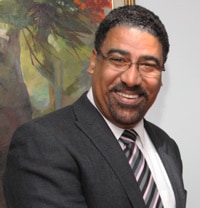Grenada Government Investing in Jobs and Youth in 2011
GRENADA – The Grenada government is planning to spend more than EC$700 million on jobs, establishing a medical teaching hospital and other initiatives over the next 12 months.
The government’s plans were outlined Friday, January 14, by Finance Minister Nazim Burke as he presented the 2011 Estimates of Revenue and Expenditure before a packed hall at a sitting of the House of Representatives in St. George’s.

Finance Minister Nazim Burke
This year’s EC$783.4 million budget is 15.3 percent higher than last year’s EC$675.9 million.
Among the money budgeted, $12.6 million will be spent on the introduction of a new initiative to create employment and training for at least 1500 young people under the Grenada Youth Upliftment Programme (GYUP). Last year’s allocation to GYUP was $4 million.
“We believe that the current focus of the Youth Upliftment Programme on education, training and certification is good and necessary,’’ Finance Minister Nazim Burke said during the budget presentation.
The initiative will target young unemployed school-leavers, between the ages of 16 and 25, who will be offered employment or training at a private business, state-owned enterprise or state-sponsored programme or activity.
During the period of employment and training to acquire work skills and experience, the young people will receive a basic government-paid monthly stipend.
Minister Burke’s two hours and 45 minutes’ presentation – the third budget of the National Democratic Congress administration since it was elected to office in July 2008 – was interrupted by applause from spectators in the gallery.
The Minister reported that Grenada is now the third largest economy in the OECS after Antigua and St. Lucia.
He projects that Grenada’s economy will grow between 2 and 2.5 percent this year, higher that the 1.8 percent for other nations of the Organization of Eastern Caribbean States.
Hon. Burke, who is also Minister of Planning, Economic Development and Energy, said the 2011 budget combines fiscal prudence and enterprise. It was carefully crafted to spur economic recovery and create jobs, he added.
The theme of the budget was, “Working Together for Economic Recovery, Job Creation and Social Protection.’’
One of the innovative measures announced by Finance Minister Burke was an agreement between government and St. George’s University (SGU) for the establishment a medical teaching hospital in Grenada.
The teaching hospital falls under health, education and wellness services that government considers a key sector for transforming the Grenada economy.
“Our Government believes this is essential to leverage the presence of St. George’s University which, according to recent surveys is regarded as the best medical school in the Caribbean,’’ Mr. Burke said.
A teaching hospital, Minister Burke explained, “would provide opportunities for the students to remain in Grenada for longer periods to do their clinical rotations and internship. This additional expenditure would have a significant impact on the domestic economy. This thrust is also timely in light of the posture of certain teaching hospitals in the USA to attempt to limit the intake of students from Caribbean medical schools.’’
More importantly, the Minister added, the administration of Prime Minister Tillman Thomas believes that “the establishment of a teaching hospital in Grenada would help to raise the standard and quality of healthcare for citizens at home, citizens abroad desirous of returning home to retire, as well as our visitors.’’
As a first step, SGU will develop a clinical teaching programme at the General Hospital in St. George’s by September this year, Mr. Burke said.
The Finance Minister admitted that more must be done to reduce Grenada’s unemployment, which has been put at 29 percent. However, he dismissed claims that government has done nothing to create jobs or has exacerbated the unemployment situation in the 30 months it has been in office.
THE NDC administration, he said, has not only met but has surpassed the number of jobs it had promised to create in 2010.
“Based on statistics from the National Insurance Scheme for the first 10 months of 2010, newly registered employees or first-time employees totaled 1,542, compared to 1,538 for the same period in 2009,’’ he said. “Approximately 73 percent of these first-time employees belonged to the age group 16 to 24 years and are classified mainly in the construction, retail trade, real estate and business services, and community services. In addition to these permanent jobs, government was able to create 16,000 temporary jobs through its public works programmes.’’
The Finance Minister also reported that foreign direct investment – through the Grenada Industrial Development Corporation – was also responsible for providing jobs for Grenadians.
“In terms of short term employment, 16,047 jobs were created under the road maintenance programme’s fortnightly rotations, with an expenditure of $9.5 million,’’ he said. “Mr. Speaker, having regard to the information received from the NIS, GIDC as well as the Ministry of Works, we are satisfied that government met its stated target of 1,500 permanent jobs and surpassed its target of 15,000 temporary jobs.’’
Another area of major investment by the government over the next year is in community development.
“In an effort to improve livelihoods in communities around the country, the budgetary allocation for community development is almost doubled from $2.75 million to $5.25 million,’’ Mr. Burke disclosed.
“This budget will provide an average of $350,000 for each of the 15 constituencies. It will go a long way to provide short-term employment for local residents, as well as improve their quality of life through community roads, drains, water courses, and other facilities.’’
In a move, expected to be welcomed by the trade union movement, Mr. Burke announced that government was eliminating tax on severance packages given to laid off workers.
The tax exemption will affect workers who lost their jobs from September 2008 and will cover the period up to 2012.
The Finance Minister, in an update on the Value Added Tax (VAT) that was reintroduced a year ago, said it contributed $138 million to Grenada’s revenue, $5.2 million short of the approved estimates.
VAT together with the Excise Tax accumulated some $146.3.
Minister Burke said that in the coming year, the VAT Unit will increase public education on the Value Added Tax and vigorously pursue those attempting to defraud the government of its revenues after collecting VAT from consumers.
The Finance Minister also said government intends to use its diplomatic engagements as a means of advancing the country’s national interests.
“The Ministry of Foreign Affairs will continue to make concerted efforts to ensure that relations with Grenada’s traditional allies are maintained and strengthened,’’ he said. “At the same time, the Ministry will aggressively pursue the establishment and development of ties with non-traditional allies such as newly emerging powers like China, India and Brazil. Government will also continue to pursue bilateral cooperation with States in the Middle East and North Africa.’’




